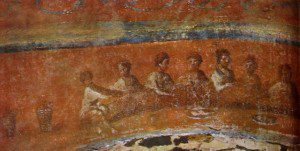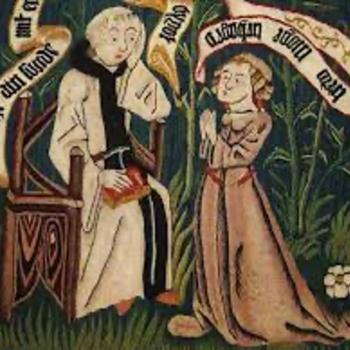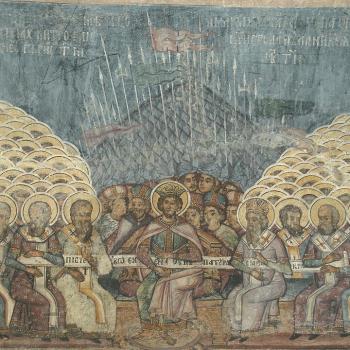“My reading of the Bible finds plenty of reminders that it’s better to teach someone to fish than to give them fish if they’re able,” said Wisconsin Governor Scott Walker shortly after his most recent electoral victory, “…Caring for the poor isn’t the same as taking money from the federal government to lock more people into Medicaid.”
Yes, job skills, especially if they lead to jobs, are certainly better than handouts, and one can always criticize our dysfunctional system of health insurance. And one hardly wants to quibble with someone who, as Ohio Governor John Kasich commented, “runs for election every week … [and] wins.”
But Scott Walker is a preacher’s kid who should know his Bible a bit better. Perhaps a review is in order before a 2016 run for the White House. Jesus seemed to have no problem with free food and drink. The disciples wanted the crowds of people who followed Jesus to head home and take care of themselves, but Jesus said, no, “you give them something to eat.” Soon a few loaves and a few fish fed a multitude. If only government spending had that sort of multiplier! Even worse, in the gospels of Mark and Matthew, Jesus feeds another crowd a short while later in roughly the same manner. Didn’t Jesus know he might create a culture of dependency?
These are not the only examples. Jesus also turned water into wine at a wedding, covering for the host’s lack of foresight. And stretching back into the history of the ancient Israelites, God — undeterred by the people’s thorough lack of gratitude — rained down free food from heaven for forty years!
The above examples are not especially useful models for government programs, but there’s hardly a biblical warning against the distribution of free fish or other food. Indeed, when Christians volunteer at soup kitchens and homeless shelters or welcome someone off the street to a potluck dinner, they mirror God’s indiscriminate, abundant, and perhaps even reckless love.
Most of us are eating with family and friends today. Thanksgiving, for Americans, connects to the pilgrims’ celebration of their first harvest and to civilly proclaimed days of thanksgiving and prayer in Virginia, Massachusetts Bay, and other colonies. (Similarly proclaimed days of fasting and repentance, not surprisingly, have fallen by the wayside). Harvest festivals existed in many ancient religions, including Judaism, and Christians in many contexts made such celebrations their own.
Sharing a common meal — or banquet — was central to early Christianity, adapted from ancient Greek and Roman customs, stripped of excess and sacrificial meat and enhanced with Christian hymns, prayers, and rituals. In response to rumors that Christians ate human flesh (including sacrificed children), Pliny the Young investigated the matter and reported that the food was “everyday and prosaic.” Christians ate bread and drank wine mixed with water. Other early Christians meals, according to Andrew McGowan in his Ancient Christian Worship , featured oil, vegetables, perhaps even fish.
In some early communities, as demonstrated in Paul’s letters, Christians celebrated what to us would be recognizable as the Eucharist (from a Greek noun meaning “thanksgiving”), eating the bread and wine in memory of Jesus’s sacrificial death, linked to the Last Supper as described in the gospels of Mark, Matthew, and Luke.
As many scholars have observed, however, not all Eucharist liturgies focused on the Last Supper or even on Jesus’s death. For example, the Didache (an early Christian text dating from perhaps the late first century) includes the following simple prayers: “‘We give thee thanks, Our Father, for the holy vine of David Thy son, which Thou hast made known to us through Jesus Thy Son; to Thee be glory forever.’ And in connection with the breaking of bread, ‘We give Thee thanks, Our Father, for the life and knowledge which Thou hast revealed to us through Jesus Thy Son; to Thee be glory forever.’ As this broken bread was scattered upon the mountain tops and after being harvested was made one, so let Thy Church be gathered from the ends of the earth into Thy kingdom.”
In his Reconstructing Early Christian Worship, Paul Bradshaw suggests that “much Christian thinking about eucharistic presence in the first and second centuries … continued to follow what might be described as Johannine rather than Synoptic or Pauline paths.” Some Christians, as they celebrated their common meals and later as they celebrated the Eucharist, thought not about Jesus’s Passover meal or Last Supper but instead thought about the words Jesus shortly after feeding the multitude on a Galilean mountainside. “I am the bread of life,” Jesus told the people. “…Whoever eats my flesh and drinks my blood has eternal life, and I will raise him up at the last day.” Many of Jesus’s followers desert him after this “hard teaching.”

Frescoes in Roman catacombs reveal images of Eucharistic meals featuring bread and fish, with baskets recalling the collection of the extra food collected after the miraculous feedings. Eventually, Eucharistic prayers and devotion focused far more on the narrative of the Last Supper (and the words of institution in 1 Corinthians). Bradshaw suggests that “a valuable insight was lost by an excessive focus on the power of his sacrificed body and blood and a consequent diminishing of the value of his living and nourishing flesh and blood.” Perhaps both during our receipt of the Lord’s Supper and during our sharing of meals with fellow Christians, we might remember the words of Jesus as he broke bread and distributed it to those who hungered.
Shortly after he feeds the multitude in the Gospel of John, Jesus goes to to Jerusalem for the Feast of Tabernacles, celebrating the end of the harvest. Echoing both his words to the Samaritan woman and the well and his teaching to the crowd he had fed, Jesus stands up on the last day of the feast and says, “If anyone is thirsty, let him come to me and drink. Whoever believes in me, as the Scripture has said, streams of living water will flow within him.”
So yes, Jesus gave the people free food and drink, heavenly gifts that satisfied them for a few hours. Jesus also brought the “bread of heaven” and the “living water” that would “become in them a spring of water gushing up to eternal life.” Those costly gifts were also free, also indiscriminate, abundant, and even reckless. Thanks be to God.












